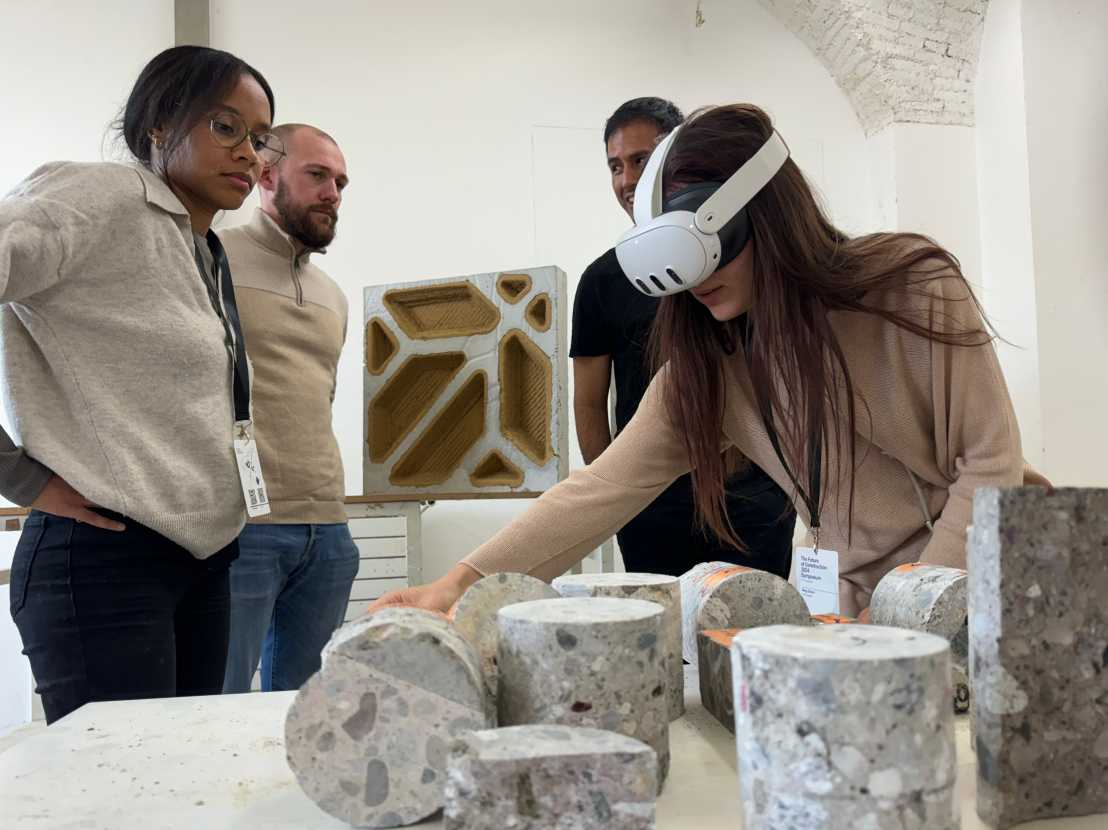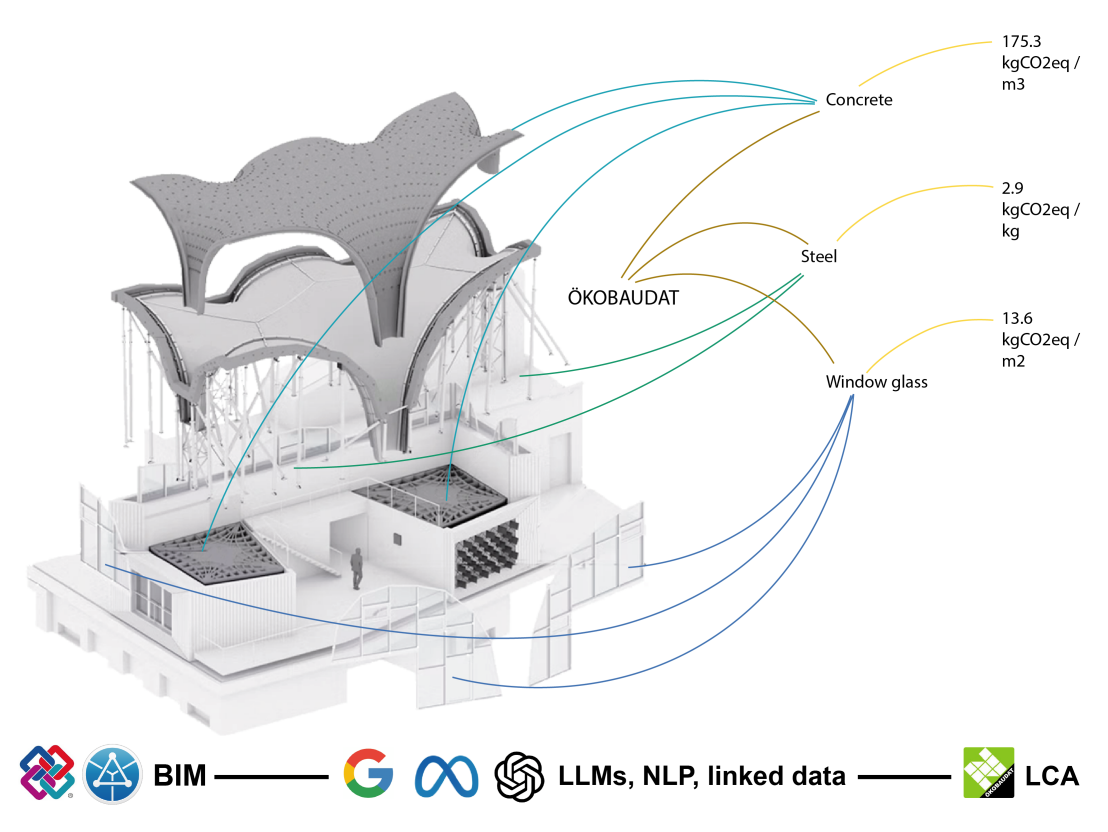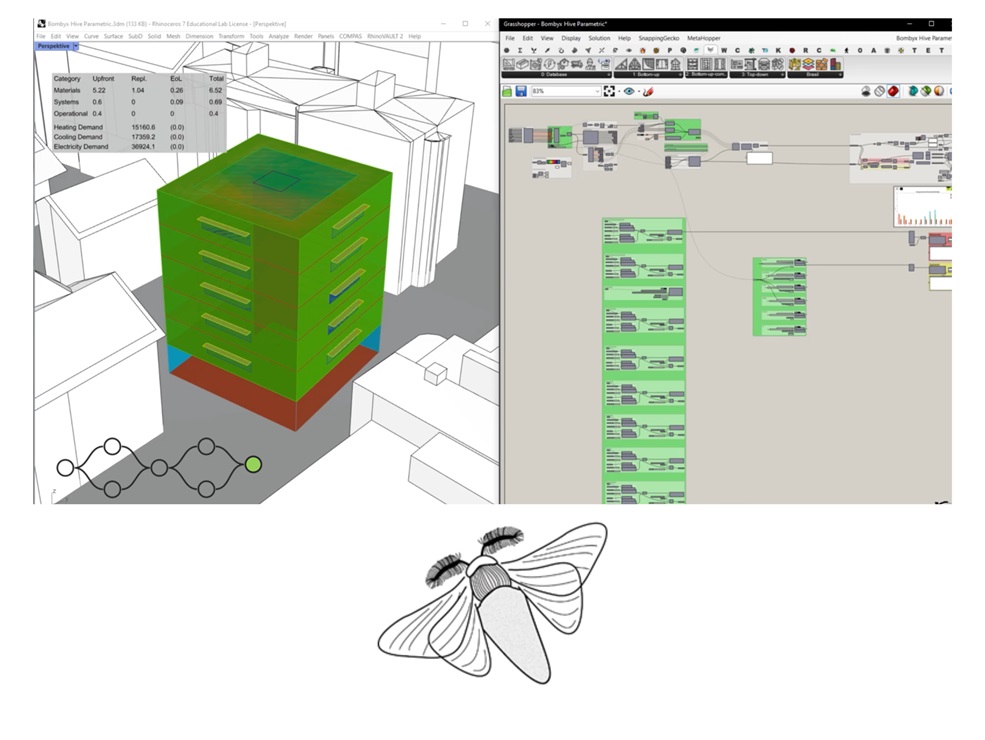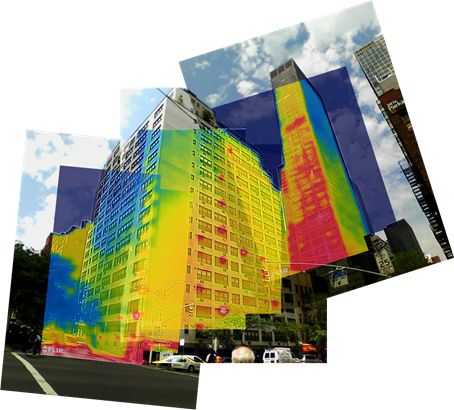Workshops
The conference week will start with a workshop block, where selected workshops of varying length and for varying audiences will touch upon the topics central to the conference. More information on the respective workshop topics, organisers, and the number of participants is provided below.
Workshops can be booked through the online registration process in external page ConfTool.
1 | From Waste to Resource: Digital Design and XR-Guided Assembly for Circular Construction

This full-day workshop explores the reuse of construction waste through computational design and extended reality (XR)-guided assembly. Participants will learn to digitize, optimize, and assemble discarded concrete elements into new architectural structures.
By the end of the workshop, students will be able to:
- Capture and process digital models of waste materials using 3D scanning tools, ensuring accuracy in geometry representation.
- Apply computational design techniques in Rhino and Grasshopper to analyze and integrate scanned materials into a structured design.
- Develop and test digital assembly sequences in Unity, incorporating real-time visualization and logical assembly steps.
- Assemble a physical prototype using XR-guided workflows, ensuring correct placement and alignment of repurposed materials.
- Number of participants: 5 – 10
- Duration: 9 AM - 5 PM (full-day)
- Participation fee: 100 CHF (Price includes coffee breaks but not lunch)
- Participant Information:
- Intended audience:
- Students and researchers in architecture, engineering, computational design, and digital fabrication.
- No prior experience with XR is required, but familiarity with 3D modeling is beneficial.
- Prerequisites:
- Basic understanding of Rhino and Grasshopper
- Interest in circular construction, digital fabrication, and emerging technologies.
- Intended audience:
- Equipment and Materials:
- Participants should bring:
- A laptop with:
- Rhinoceros 7 or 8 installed
- Grasshopper Plugins: OpenNest and Polyhedra
- Unity (latest stable version)
- Provided by instructors:
- XR Equipment:
- x3 Meta Quest headsets (for AR-guided assembly)
- x2-3 LIDAR-enabled iPhones/iPads (for 3D scanning)
- Extension cables for laptops and devices
- Participants should bring:
- Organisers:
- Beril Önalan, Doctoral Researcher, ETH Zurich, Switzerland. Her research focuses on integrating digital design workflows for material reuse.
- Eleftherios Triantafyllidis, Postdoctoral Researcher, ETH Zurich, Switzerland. His research focuses on the intersection of ML, Robotics, and Human Factors with a deep passion for (XR).
- Ioanna Mitropoulou, Postdoctoral Researcher, ETH Zurich, Switzerland. Her research focuses on developing computational methods that enable incorporating reclaimed materials into new designs.
2 | Life Cycle Assessment of BIM models using LLM workflows

In this workshop, participants will learn how to integrate LLM-based life cycle assessment (LCA) in building design with BIM. Embodied emissions are evaluated for a BIM model using novel workflows based on COMPAS and LLMs.
An initial reference model will be provided, that will be manually and semi-automatically enriched with LCA Data to perform life cycle analysis. LLMs will then be used on this ground truth to test match-making and semi-automated attribution.
- Topics covered: BIM, IFC, LCA, environmental product declarations (EPDs), ontologies
- Learning objective: students are able to evaluate embodied emissions of a BIM model using an LLM-based workflow, using Python.
- Number of participants: 10 – 20
- Duration: 9 AM - 5 PM (full-day)
- Participation fee: 100 CHF (Price includes coffee breaks but not lunch)
- Participant Information:
- Intended audience: PhD students in the field of LCA & BIM, interested in automating LCI dataset enrichment
- Prerequisites: Python, basic understanding of LCA and BIM preferred
- Equipment and Materials:
- Participants should bring:
- A laptop with various open-source software installed (details to be provided
- Participants should bring:
- Organisers:
- Jakob Beetz, Full Professor, RWTH Aachen University, Germany. His work focuses on interoperability for Building Information Modelling.
- Li Chen is a PhD researcher and software engineer at Block Research Group at ETH Zürich, his work focuses on data modeling for Architecture, Engineering and Construction (AEC).
- Kasimir Forth is a postdoc at the Chair of Circular Engineering for Architecture at ETH Zurich. His work focuses on the semantic enrichment of environmental assessments using BIM, point clouds, and different AI models, such as LLM.
- Cemre Karaoglan is a doctoral student at RWTH Aachen University, Germany. Her work focuses on LCA- integration for Building Information Modelling.
- Heidi Silvennoinen is a PhD researcher at the Chair of Circular Engineering for Architecture at ETH Zurich. Her work focuses on assessing environmental impacts in the early design stage.
- Silvia Vangelova is a PhD researcher at the Chair of Circular Engineering for Architecture at ETH Zurich. Her work focuses on facilitating the management of construction projects and product information using LLMs and BIM.
3 | Decarbonise cities through science and urban design with CEA-4

Join the City Energy Analyst (CEA-4) Team at SBE Zurich 2025 for a hands-on workshop introducing CEA-4, freshly launched in April 2025 by ETH Zurich. This session will demonstrate how urban designers can quickly (within minutes) and effectively model energy performance at the district scale.
Participants will learn how to forecast building energy demand and emissions, assess on-site renewable energy potentials, and design and optimise district thermal energy systems – all under one platform.
By the end of the workshop, students will be able to use CEA-4 to evaluate the energy performance of an urban quarter, making data-driven decisions to support sustainable urban development. No prior experience is required!
- Number of participants: 5 – 25
- Duration: 9 AM - 12:30 PM (half-day)
- Participation fee: 50 CHF (Price includes coffee breaks but not lunch)
- Participant Information:
- Intended audience: architects, urban designers, energy engineers
- Prerequisites: Ideally, some computational modelling experience using such tools as Rhino/Grasshopper
- Equipment and Materials:
- A personal laptop with macOS or Windows
- Organisers:
- Zhongming Shi, Product Lead of CEA and Lecturer, ETH Zurich, Switzerland. His work focuses on decarbonising cities through urban design and urban building energy modelling.
- Reynold Mok, Software Engineer, ETH Zurich, Switzerland. His work focuses on full-stack development and Cloud deployment of CEA.
4 | Early-stage Parametric LCA for Building Projects with Bombyx

Early-stage design choices in projects significantly impact decision-making for lowering greenhouse gas emissions in the construction sector.
In this workshop, participants will use the Bombyx plugin for Grasshopper in order to:
- Create an automated life cycle assessment workflow to iterate through design alternatives and explore building parameters, including location, geometry, and construction materials
- Analyze and compare the environmental impact of different design choices, evaluating the impact and interplay of the explored parameters.
- Apply a holistic approach to calculate building life cycle emissions based on material- and energy use.Integrate other plugins into the script for building energy simulations, parameter optimization, and script automation.
- Number of participants: 5 – 25
- Duration: 1:30 PM - 5 PM (half-day)
- Participation fee: 50 CHF (Price includes coffee breaks but not lunch)
- Participant Information:
- Intended audience:
- Students interested in computational design and LCA
- Researchers working on building life cycle emissions
- Industry professionals in Sustainability, Architecture, and BIM
- Prerequisites:
- Familiarity with LCA principles in the construction sector
- Basic knowledge of Rhino & Grasshopper
- Intended audience:
- Equipment and Materials: The computers and all required software are provided by the workshop team. Optionally, if you would like to bring your own device, a Windows device with Rhino 8 (incl. valid license) is recommended.
- Organisers:
- Pedram Mirabian, B. Sc. Civil Engineering, M. Sc. ETH Integrated Building Systems, Research Assistant at the chair of Sustainable Construction, interested in the use of computational design in assessing the environmental impact of the building sector.
- Alina Galimshina, senior lecturer, Nosov Magnitogorsk State Technical University, Russia. Her research focuses on the development of environmental building design strategies.
5 | Getting Comfortable with Comfort Measurements and Lessons Learned from Years of Discomfort

What is comfort? That is the answer – Watt is comfort… the human body needs to reject a certain number of Watts of heat to maintain thermal equilibrium, and the amount of thermal response required to maintain that equilibrium is the true underlying driver of comfort. Sweating and shivering are examples of uncomfortable responses at either extreme of hot and cold. We will challenge the false paradigm that there is a “comfortable room temperature.” More than half of the heat leaving your body in a typical room leaves by thermal radiation exchanged with the surfaces around you.
In this workshop, participants will:
- Learn and measure how the physics of comfort is the physics of heat transfer, and this is governed largely by 4 physics variables: air temperature, air humidity, air velocity, and radiant heat.
- Use the CHAOSense Comfort Cube sensor to measure all 4 of these variables and evaluate how different spaces with the same temperature have significantly different thermal comfort characteristics.
- Learn about the history of radiant systems and visit some original prototype systems from the 2000s on the Honggerberg Campus. We will learn about some of the challenges of controlling radiant heat transfer in the context of contemporary air-based thermostat dominated control systems.
- Number of participants: 5 – 20
- Duration: 1:30 PM - 5 PM (half-day)
- Participation fee: 50 CHF (Price includes coffee breaks but not lunch)
- Participant Information:
- Intended audience:
- Researchers interested in thermal comfort, experimental methods, and alternative comfort paradigms.
- Prerequisites:
- Having been uncomfortable, and some familiarity with the modes of heat transfer.
- Intended audience:
- Equipment and Materials:
- Be comfortable with walking around campus.
- We will bring sensors to measure temperature, humidity, air movement.
- Might be useful to have a laptop or phone to download some data
- Organisers:
- Prof. Dr. Forrest Meggers, Princeton University
- Prof. Dr. Dorit Aviv, University of Pennsylvania
- Vincenzo Gentile, Politecnico di Torino